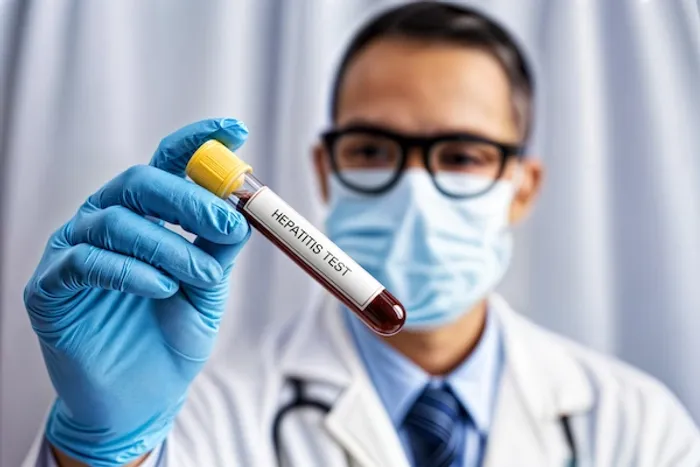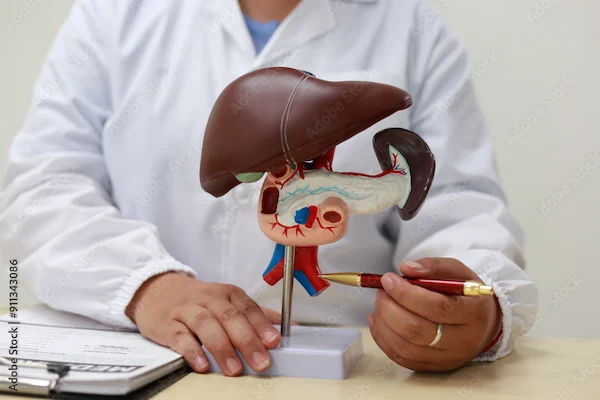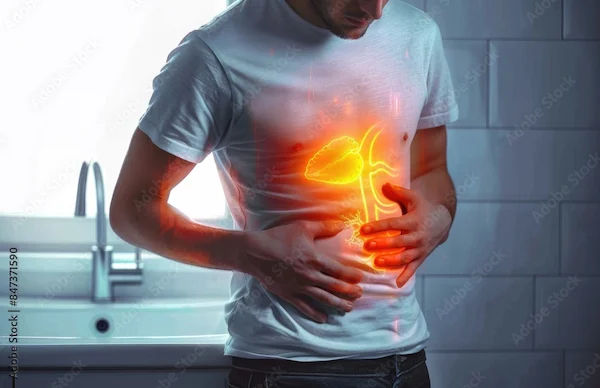Hepatitis: Types, Causes, and Symptoms
Learn about hepatitis, including its different types, common causes, and symptoms, to better understand this liver condition.

Written by Dr. Md Yusuf Shareef
Reviewed by Dr. D Bhanu Prakash MBBS, AFIH, Advanced certificate in critical care medicine, Fellowship in critical care medicine
Last updated on 13th Jan, 2026

Introduction
Hepatitis is a medical term that simply means inflammation of the liver. This vital organ processes nutrients, filters blood, and fights infections. When it becomes inflamed or damaged, its function can be seriously affected. While many people associate hepatitis with viruses, it can actually be caused by a variety of factors, including heavy alcohol use, toxins, certain medications, and even autoimmune diseases. The signs of hepatitis can be vague and flu-like, sometimes making it a "silent" condition until significant liver damage has occurred. Understanding the different hepatitis types, what leads to them, and their specific warning signs is the first crucial step toward prevention, early detection, and effective treatment. This guide will break down the five main viral hepatitis types (A, B, C, D, and E) as well as other non-viral causes, empowering you with the knowledge to safeguard your liver health.
The Five Main Viruses: A Breakdown of Hepatitis Types
The most common causes of hepatitis are viral infections. These are categorised into five main types: A, B, C, D, and E, each with distinct causes, modes of transmission, and health outcomes. Knowing the difference is key to understanding your risk and the potential symptoms of chronic hepatitis.
1. Hepatitis A (HAV): The Acute Short-Term Infection
Hepatitis A is a highly contagious but short-lived liver infection. It does not lead to chronic disease, and most people recover completely without permanent liver damage.
What Causes Hepatitis A? The Faecal-Oral Route Explained
- The hepatitis A virus (HAV) is primarily spread through the "faecal-oral route." This means you ingest microscopic amounts of stool from an infected person. This can happen through:
Consuming contaminated food or water. - Close personal contact with an infected person (e.g., through sexual contact or caring for someone who is sick).
- Poor hand hygiene after using the toilet or changing a diaper.
Recognising the Signs of Hepatitis A Infection
Not everyone with HAV shows symptoms, but when they do, they typically appear 2-6 weeks after exposure and can include:
- Sudden onset of fatigue and nausea
- Abdominal pain, especially on the right side under the ribs
- Clay-colored stools and dark urine
- Loss of appetite
- Low-grade fever
- Jaundice (yellowing of the skin and eyes), a classic sign of liver distress
2. Hepatitis B (HBV): A Potentially Chronic Threat
Hepatitis B is a more serious infection that can cause both acute and chronic liver disease. The World Health Organization (WHO) estimates that in 2019, 296 million people were living with chronic hepatitis B infection.
How is Hepatitis B Transmitted? Beyond Blood-to-Blood
The hepatitis B virus (HBV) is transmitted through contact with infectious blood, semen, or other body fluids. Common routes include:
- From mother to child during childbirth (a major cause of global transmission).
- Unprotected sexual contact with an infected partner.
- Sharing needles, syringes, or other drug-injection equipment.
- Accidental needle sticks or sharps injuries in healthcare settings.
- Sharing razors or toothbrushes with an infected person.
Acute vs. Chronic Hepatitis B: Symptoms and Long-Term Risks
Acute HBV can cause symptoms similar to HAV (fatigue, jaundice, nausea). The critical difference is that HBV can become chronic, particularly if infected as an infant or young child. Chronic hepatitis B can lead to severe complications like cirrhosis (scarring of the liver), liver failure, and liver cancer. Many people with chronic HBV have no early signs of hepatitis and may feel perfectly healthy for decades while the virus damages their liver.
3. Hepatitis C (HCV): The Silent Epidemic
Hepatitis C is a major cause of chronic liver disease and liver transplants. For many years, most infections become chronic, but modern treatments can cure over 95% of cases.
Primary Causes and Risk Factors for Hepatitis C
Hepatitis C (HCV) is primarily spread through blood-to-blood contact. The most common route is:
- Sharing contaminated needles during intravenous drug use.
- Historically, it was also spread through blood transfusions and organ transplants before widespread screening began in 1992. Other risks include unsterile medical or tattoo equipment and, less commonly, sexual contact.
Why Hepatitis C Symptoms Often Go Unnoticed
Acute Hepatitis C is famously asymptomatic. Most people are entirely unaware they are infected. It is often discovered decades later during routine blood tests that show elevated liver enzymes or when symptoms of chronic hepatitis C and liver damage finally appear, such as easy bruising, bleeding, and fluid buildup in the abdomen (ascites).
4. Hepatitis D (HDV): The Incomplete Virus
Hepatitis D is a unique and rare form of hepatitis that only occurs in people who are already infected with Hepatitis B.
How Hepatitis D Coinfection Works
The hepatitis D virus (HDV) is a "satellite" virus that requires the HBV surface antigen to replicate. You cannot get HDV without having HBV. This coinfection can lead to a much more severe and aggressive form of liver disease than HBV alone. It is transmitted through the same routes as HBV: percutaneous or mucosal contact with infected blood.
5. Hepatitis E (HEV): A Concern in Specific Settings
Similar to HAV, Hepatitis E is typically an acute, self-limiting infection spread through the faecal-oral route, often via contaminated water in areas with poor sanitation.
Causes and At-Risk Populations for Hepatitis E
While generally not chronic, hepatitis E (HEV) can be particularly dangerous for pregnant women, especially in their third trimester, where it can lead to acute liver failure and a high risk of mortality. In developed countries, rare cases of chronic HEV have been reported in immunocompromised individuals.
Consult a Hepatologist for the best advice
Less Common Causes: Non-Viral Hepatitis
Not all hepatitis is caused by a virus. Liver inflammation can also result from other insults.
Alcoholic Hepatitis: The Impact of Excessive Drinking
This is caused by years of heavy alcohol consumption. Alcohol is toxic to liver cells, and over time, it can lead to inflammation, fatty liver, and eventually, alcoholic hepatitis and cirrhosis. Signs of hepatitis from alcohol can include jaundice and abdominal swelling.
Autoimmune Hepatitis: When the Body Attacks Itself
In this rare condition, the body's own immune system mistakenly attacks the liver, causing inflammation and damage. The exact cause is unknown, but it is believed to be a combination of genetic and environmental factors.
Toxic and Drug-Induced Hepatitis
The liver processes chemicals and drugs, making it vulnerable to damage from overdose or a toxic reaction. This can be caused by prescription drugs (e.g., certain antibiotics), over-the-counter medications (e.g., high doses of acetaminophen), herbal supplements, or industrial chemicals.
When to See a Doctor: Recognising the Warning Signs
If you experience any combination of persistent fatigue, nausea, abdominal pain, dark urine, or jaundice, it is crucial to seek medical advice. If these symptoms persist beyond two weeks, consult a doctor online with Apollo24|7 for further evaluation. Early diagnosis of viral hepatitis can prevent transmission to others and, for types like B and C, allow for management that can prevent serious liver damage.
Prevention is Key: Vaccinations and Lifestyle Choices
Protecting your liver starts with smart choices.
- Vaccinate: Safe and effective vaccines are available for Hepatitis A and B. The Hepatitis B vaccine also protects against Hepatitis D.
- Practice Good Hygiene: Wash your hands thoroughly with soap and water after using the bathroom, changing a diaper, and before preparing or eating food.
- Be Safe with Blood: Avoid sharing needles, razors, or toothbrushes. Ensure any tattoos or piercings are done with sterile equipment.
- Practice Safe Sex: Use barrier methods like condoms to reduce the risk of sexually transmitted HBV and HCV.
- Drink Responsibly: Moderating alcohol intake is one of the best ways to prevent non-viral hepatitis.
- Get Tested: If you have risk factors, get a simple blood test. Apollo24|7 offers a convenient home collection for tests like liver function panels (LFTs) and hepatitis serology, making it easy to check your liver health.
Get Your Health Assessed
Conclusion: Knowledge is Your Best Defense
Hepatitis, in its various forms, remains a significant global health challenge. However, it is largely preventable and, in many cases, treatable. The journey through the different hepatitis types reveals a clear message: understanding what leads to infection is your most powerful tool. From the food and water-borne HAV and HEV to the blood-borne HBV and HCV, each virus has a specific transmission path that can be blocked through vaccination, hygiene, and mindful practices. Furthermore, being aware of non-viral causes like alcohol and toxins empowers you to make lifestyle choices that protect your liver. Listen to your body. The signs of hepatitis can be subtle, but recognising them early and seeking professional guidance can make all the difference. Proactive health measures, including vaccination and testing, are investments in your long-term well-being, ensuring your liver continues to perform its hundreds of essential functions unimpeded.
Consult a Hepatologist for the best advice
Consult a Hepatologist for the best advice

Dr. Pavan Kumar Y M
Gastroenterology/gi Medicine Specialist
5 Years • MBBS, MD Medicine, DM Gastroenterology
Bengaluru
Apollo Medical Center, Marathahalli, Bengaluru

Dr. Pukhraj Singh Jeji
Gastroenterology/gi Medicine Specialist
13 Years • MBBS, MD ( Internal Medicine ), DM ( Gastroenterology ), Consultant - Gastroenterology
Bhubaneswar
Apollo Hospitals Old Sainik School Road, Bhubaneswar

Dr. Aakash Garg
Gastroenterology/gi Medicine Specialist
12 Years • MBBS, DNB (Medicine), DrNB (Gastroentrology).
Bilaspur
Apollo Hospitals Seepat Road, Bilaspur
(150+ Patients)

Dr. E Prabhakar Sastry
General Physician/ Internal Medicine Specialist
40 Years • MD(Internal Medicine)
Manikonda Jagir
Apollo Clinic, Manikonda, Manikonda Jagir
(150+ Patients)

Dr. Srinivasa Reddy
Hepatologist
12 Years • MBBS, MD (General Medicine), DM (Hepatology),ASGE
Hyderabad
Myra Liver & Gastro Care, Hyderabad
Consult a Hepatologist for the best advice

Dr. Pavan Kumar Y M
Gastroenterology/gi Medicine Specialist
5 Years • MBBS, MD Medicine, DM Gastroenterology
Bengaluru
Apollo Medical Center, Marathahalli, Bengaluru

Dr. Pukhraj Singh Jeji
Gastroenterology/gi Medicine Specialist
13 Years • MBBS, MD ( Internal Medicine ), DM ( Gastroenterology ), Consultant - Gastroenterology
Bhubaneswar
Apollo Hospitals Old Sainik School Road, Bhubaneswar

Dr. Aakash Garg
Gastroenterology/gi Medicine Specialist
12 Years • MBBS, DNB (Medicine), DrNB (Gastroentrology).
Bilaspur
Apollo Hospitals Seepat Road, Bilaspur
(150+ Patients)

Dr. E Prabhakar Sastry
General Physician/ Internal Medicine Specialist
40 Years • MD(Internal Medicine)
Manikonda Jagir
Apollo Clinic, Manikonda, Manikonda Jagir
(150+ Patients)

Dr. Srinivasa Reddy
Hepatologist
12 Years • MBBS, MD (General Medicine), DM (Hepatology),ASGE
Hyderabad
Myra Liver & Gastro Care, Hyderabad
More articles from Hepatitis
Frequently Asked Questions
Can hepatitis be cured?
Yes, many forms can. Hepatitis A and E typically resolve on their own. Hepatitis C is now curable with modern antiviral medications. Hepatitis B is not curable but is controllable with antiviral drugs that suppress the virus and prevent liver damage.
What is the main difference between hepatitis A and B?
The main difference is their potential to cause chronic disease. Hepatitis A is an acute, short-term illness. Hepatitis B can become a long-term, chronic infection that leads to serious health issues.
How can I get tested for hepatitis?
A simple blood test can detect the presence of viruses or antibodies against them. If you suspect exposure or have risk factors, speak to a doctor. Apollo24|7 offers convenient home collection for tests to check your hepatitis status and liver function.
Are the early signs of hepatitis different for each type?
The initial symptoms (fatigue, nausea, jaundice) are often very similar across all types, making it impossible to distinguish them without a blood test. This is why medical evaluation is essential.
Is there a vaccine for all hepatitis types?
No. Currently, safe and effective vaccines exist only for Hepatitis A and B. Because Hepatitis D requires HBV to infect a person, the Hepatitis B vaccine also protects against HDV. There is no vaccine for Hepatitis C or E commercially available globally yet.





